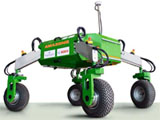Agricultural and Biological Systems Engineering, Department of

Department of Agricultural and Biological Systems Engineering: Faculty Publications
Document Type
Article
Date of this Version
2016
Citation
Oh H, Custead R, Wang Y, Barlow S (2017)
Abstract
Neurons in the somatosensory cortex are exquisitely sensitive to mechanical stimulation of the skin surface. The location, velocity, direction, and adaptation of tactile stimuli on the skin's surface are discriminable features of somatosensory processing, however the representation and processing of dynamic tactile arrays in the human somatosensory cortex are poorly understood. The principal aim of this study was to map the relation between dynamic saltatory pneumatic stimuli at discrete traverse velocities on the glabrous hand and the resultant pattern of evoked BOLD response in the human brain. Moreover, we hypothesized that the hand representation in contralateral Brodmann Area (BA) 3b would show a significant dependence on stimulus velocity. Saltatory pneumatic pulses (60 ms duration, 9.5 ms rise/fall) were repetitively sequenced through a 7-channel TAC-Cell array at traverse velocities of 5, 25, and 65 cm/s on the glabrous hand initiated at the tips of D2 (index finger) and D3 (middle finger) and sequenced towards the D1 (thumb). The resulting hemodynamic response was sampled during 3 functional MRI scans (BOLD) in 20 neurotypical righthanded adults at 3T. Results from each subject were inserted to the one-way ANOVA within-subjects and one sample t-test to evaluate the group main effect of all three velocities stimuli and each of three different velocities, respectively. The stimulus evoked BOLD response revealed a dynamic representation of saltatory pneumotactile stimulus velocity in a network consisting of the contralateral primary hand somatosensory cortex (BA3b), associated primary motor cortex (BA4), posterior insula, and ipsilateral deep cerebellum. The spatial extent of this network was greatest at the 5 and 25 cm/s pneumotactile stimulus velocities.
Included in
Bioresource and Agricultural Engineering Commons, Environmental Engineering Commons, Other Civil and Environmental Engineering Commons


Comments
PLoS ONE 12(8): e0183532.
https://doi.org/10.1371/journal. pone.0183532